These are people with lives but they have been put on hold. And, although things are said to have calmed down considerably since xenophobic violence erupted in KwaZulu-Natal three weeks ago, these thousands of foreigners face an uncertain fate. With seven people killed at the height of the violence, they still fear for their lives.
They are housed in four camps in the province – in Chatsworth, Phoenix, Isipingo Beach and Pietermaritzburg – which together accommodate about 5 000 people. The camps are situated on grounds that were not intended for habitation and, as a result, sanitation is a problem.
But, amid the overcrowding, litter and puddles, the spirit of hope remains alive. It is there in the actions of hundreds of volunteers who have made these camps their second home. It is in the eyes of foreigners, who sit patiently at makeshift home affairs desks, repatriation papers in hand, waiting to go home. You find it in the generosity of South Africans from various communities who come by with items or time to donate.
And, not least, it is in the dreams of dozens of inhabitants – legal or illegal in the eyes of the law – who are waiting for news of a lasting peace that will enable them to live a normal life in South Africa.
In this and the next two pages, we look at how the refugee camps have brought out the best in some South Africans and hear from the people on the receiving end about the worst in others.
Nicole Palany
Donations desk volunteer, Chatsworth refugee camp
Two weeks ago, Nicole Palany (22) and her sister arrived at the sports ground in Chatsworth’s Unit 3B, where hundreds of victims and escapees of xenophobic violence are temporarily living, to make a donation.
“We just stuck around a bit to see what was going on and helped serve lunch. After that, we have come day in and day out.”
The camp co-ordinator handed Palany a notebook and asked her to record the donated items streaming into the ground, where the 1 500 to 2 200 displaced foreigners share a few giant white marquees. The numbers fluctuate, with many people going home and others coming in.
A bespectacled Palany duly sits at a table at the entrance, under a banner marked “donations”, enthusiastically chatting to donors about a wide range of topics – from what’s needed to the problems faced by the occupants of the camp.
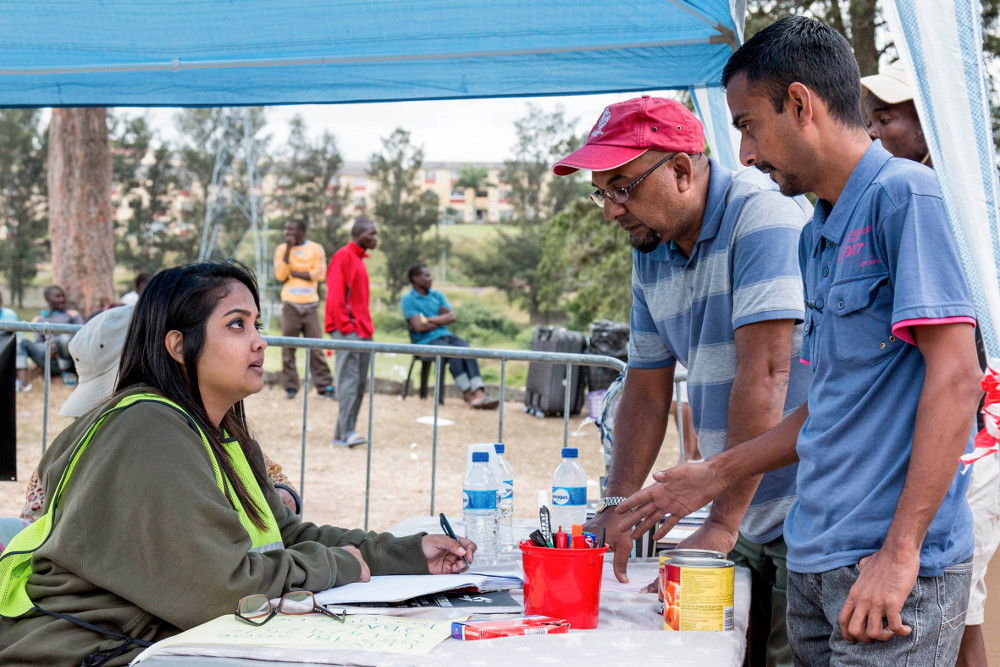
Nicole Palany is a volunteer at the Chatsworth camp. (Fayyaaz Akoob)
Attached to the front of the table are handwritten posters that inform the public about what’s required. Items listed include concentrated juice, soap, baby food, sanitary pads, plastic basins and dishcloths.
“When we came, things were very disorganised; not everything was documented. But we became more organised as the days went by. Gosh, we have a table – we didn’t even have a table when we started.”
Palany, who is studying for an honours degree in marketing, is from nearby Queensborough. She arrives at the campsite at 8am and leaves “when she has to”, sometimes as late as 11pm.
Her table is inundated, she says, particularly at the weekends and between 4pm and 7pm on weekdays, when more people are free to come and donate.
“Our community has been absolutely amazing. If you look at the storage tent, you can see that we have everything we need to give them, everything they need. We are short of nothing.”
Still, feeding 1 500 people three meals a day is no joke and several organisations chip in to make this possible. Palany records their details in a meal schedule, in a separate black book.
“We have a great number of people phoning us on a constant basis, saying they need to cook. Sometimes people even rock up here with cooked food, which we then have to send … to where it’s needed.”
It is the plight of the children that has touched Palany the most.
“The kids … man, it really breaks your heart. Lots of babies are getting lost. A kid was lost for four hours and, when we finally located her mum, she was waiting to go on a bus back to Malawi. She didn’t seem to notice that her child was missing. And the baby wasn’t even agitated; she was very relaxed.
“People have worked so hard. They have made a living and homes for themselves, and you get other people destroying that. The kids don’t deserve that. They [now] have to depend on other people for food and toiletries.”
Lumbi Maruma
Hairdresser from Zimbabwe
It’s obvious that xenophobia refugee Lumbi Maruma’s two children (aged one and nine) are her priority. She doesn’t want to return to Zimbabwe because she feels she can give them a better life in South Africa.
At the same time, she feels terrible about the problems that living in a refugee camp pose for them.
“I’m not feeling okay. Because of the problems, the big one can’t go to school. It’s not nice here, especially for my smaller child. There are other children here and many of them are sick.”
Her main needs are linked to her children: extra clothing for them, cereal and powdered milk. In fact, every few days Maruma leaves the camp and hurries to the informal settlement that she once called home, gives her toddler a bath under running water in her room, and rushes back to the camp.
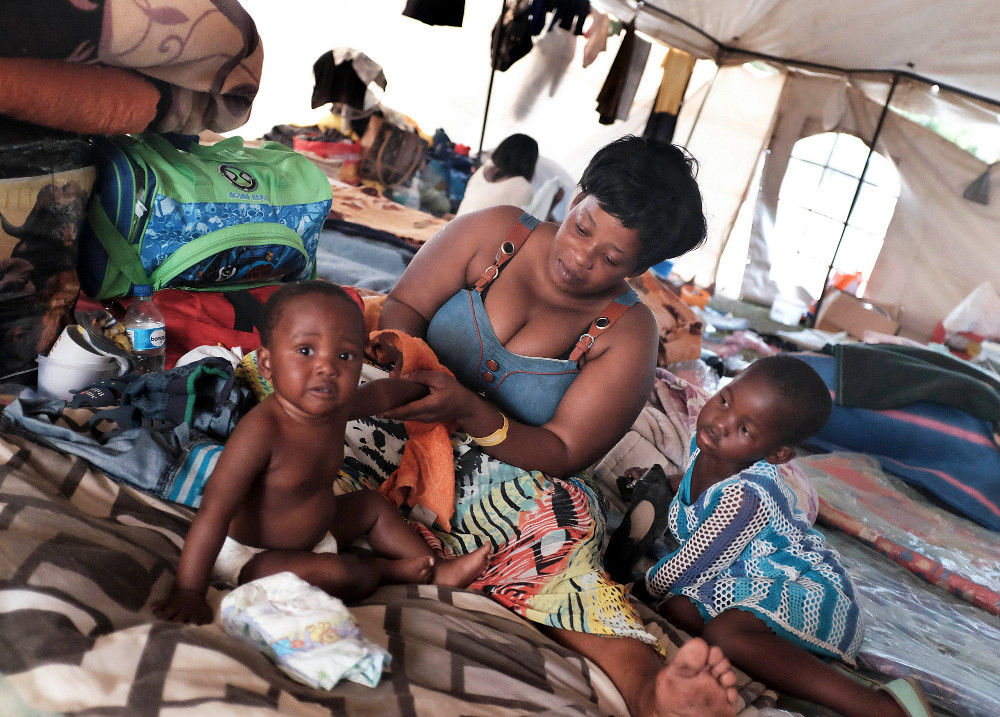
For the moment refugees are safe at the Chatsworth camp but, like Lumbi Maruma from Zimbabwe, they want things to return to normal so they can get on with their lives. (Rajesh Jantilal)
Maruma (29) is a hairdresser and ran a busy hair salon in the informal settlement. She heard rumours that somebody was going to burn down her room because she was staying there, so she fled to the refugee camp and has been living there for the past two weeks.
“People were killing people and I was afraid, so I came here.”
She came to South Africa in 2009 and has no intention of returning to Zimbabwe.
“My sister in Zimbabwe taught me hairdressing, and I came here looking for work. I then started my own salon and it was doing really well … I don’t want to go back.
“Here I can manage to support my children … I just want peace.”
Nur ‘Nic’ Holmes
Medical services overseer, Chatsworth refugee camp
Clad in blue jeans, black boots, a checked shirt and a tricoloured reflector vest, Nur “Nic” Holmes looks the part of an emergency health worker. But he still cuts a conspicuous figure – he is one of a few white volunteers at Chatsworth’s refugee camp.
“I’m a ‘wit charou‘ – what the hell!” he guffaws, when asked why he lives in Chatsworth. “Everyone knows me as the wit charou from Chatsworth.”
A computer technician by profession, Holmes is a qualified critical care assistant who, assisted by his wife Faeeza, runs Voluntary Medical Response Services, a community-based organisation that stabilises injured people at the scene of an incident. Faeeza is a basic life-support paramedic.
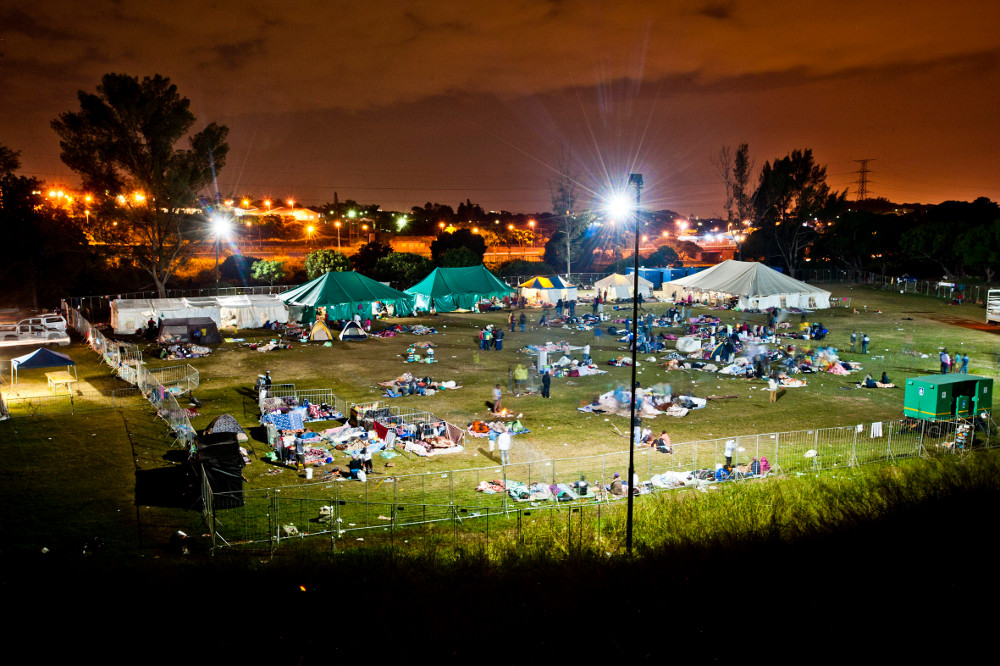
The Chatsworth camp for displaced persons. (Delwyn Verasamy, M&G)
Fifteen years ago, when a stampede occurred at the Throb nightclub in Chatsworth, claiming the lives of 13 children, the couple were among first on the scene, providing medical emergency services to the injured. Since then, the police’s “Chatsworth cluster” regularly summons their help in emergencies.
“On Easter Sunday, the police told us to go to Lusaka [an informal settlement in the area]. On arriving there, we found two foreigners lying on the floor, severely beaten up … They had stab wounds on their heads,” Faeeza says. “There were a group of South Africans surrounding them, saying that we should leave them to die and not touch them.
“But we did whatever we could. We waited for an ambulance to take them to the hospital but they both passed away after a few days.”
A couple of days later, when the camp was set up, the Holmeses and their two trainees began to provide medical treatment to arrivals at the camp from their vehicle.
“The next thing we knew they called us in and told us we were running the medical services here,” says Holmes.
A doctor from Chatsworth sponsored a tent and a stock of medical supplies. Holmes and his team have recently been joined by a team from the Islamic Medical Association, also a nongovernmental organisation.
“You have got a crowd here and wherever there’s a crowd, there are problems,” he says. “There are a lot of babies with nappy rash, which has gone out of control. We’re dealing with circumcisions gone septic, diarrhoea, malnutrition, dehydration …”
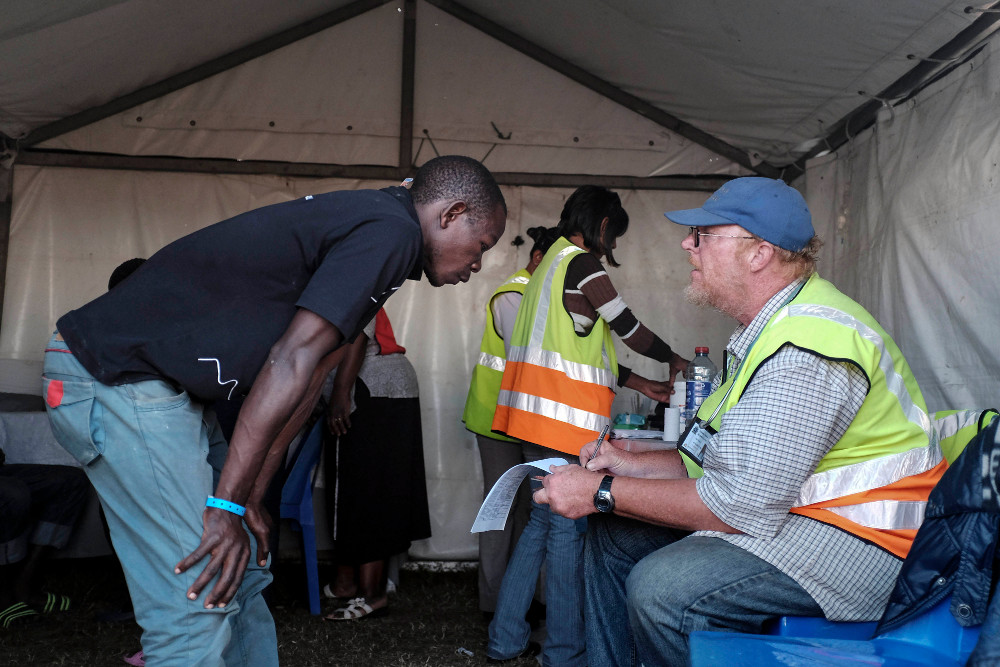
Nic Holmes oversees medical services in the Chatsworth camp. (Rajesh Jantilal)
On average, 300 patients a day are treated at the tent.
“We cope. The community has been incredible. There is help coming in from places like Glenwood, Amanzimtoti and Hillcrest, from Christian and Islamic organisations, from everybody.”
During the interview, a foreigner who’s smiling from ear to ear comes to greet Holmes and his team. “I’m going home. Bye, bye,” he says, cheerfully waving his hands.
“The ones we treated, they must come and say they are leaving. It’s so sweet,” Faeeza says. “We are very sad to see them going.”
Holmes adds: “What has happened is disgusting and disgraceful. You can’t even print how I feel about it.”
Zubair Ryegure
Refugee
I was walking through one of Durban’s refugee camps when Zubair Ryegure, a 30-year-old from Burundi, excitedly approached me, wanting to shake my hand and exchange the Islamic greeting (the salaam) with me.
When I asked him what his primary needs were, he mentioned three: a shelter in which to pray, a bucket which he could use to perform the wudhu (ablution) before prayer and a candle.
“The first thing we must do is ask God to help us because things are very bad. If we are Muslims, then we can’t leave praying for one or two days.”
Ryegure is from Muyinga province in Burundi, where he was the president of the youth wing of the Front for Democracy in Burundi, which is the main opposition in the East African country.
“The ruling party, the National Council for the Defence of Democracy, Forces for the Defence of Democracy (CNDD/FDD), wanted me to enter their party. I refused, so they put me in prison for three months without a trial.”
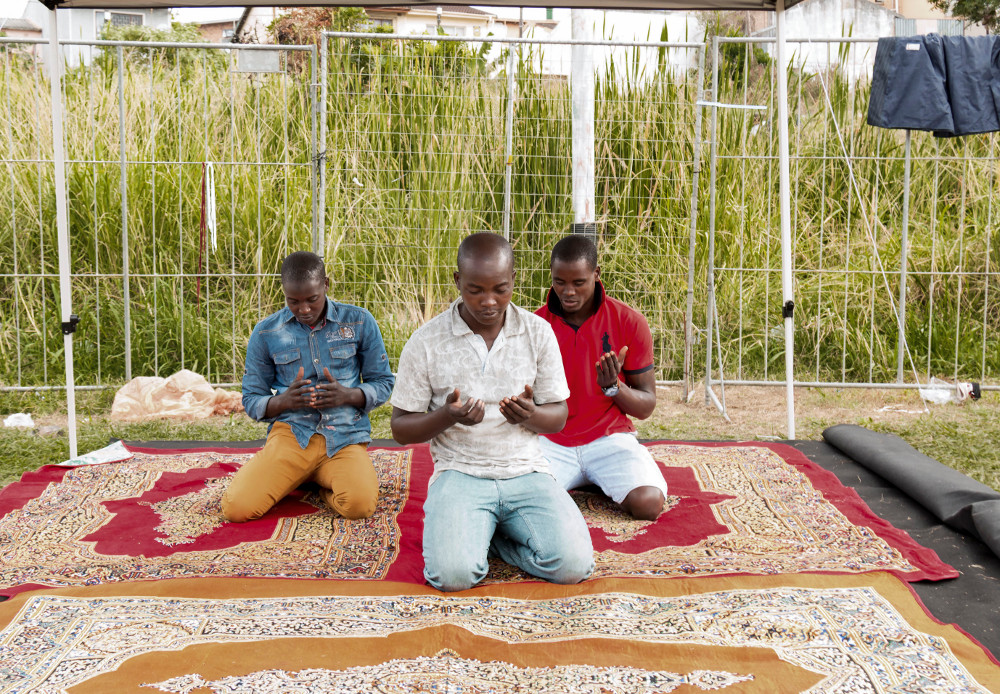
Chatsworth camp resident Zubair Ryegure can’t go home, but his future in South Africa is uncertain. (Fayyaaz Akoob)
When a judge released him, Ryegure was approached by young members of the CNDD/FDD, who told him his life would be at risk if he didn’t leave.
“They said they had a mission to kill me.”
Ryegure went into hiding for two months, before fleeing to Tanzania in January this year. From there, he went to Mozambique.
“The police in Mozambique took my phone and my clothes and they told me to go.
“I went to a mosque in Maputo and a Muslim man there gave me a ticket to come to South Africa and, when I came here, home affairs gave me a permit first for a month then for six months.”
Ryegure is a qualified topographer.
“I found out that if I’m not a national I can’t work in this field, so I was living with my friend, waiting to see if I could find a job doing motorbike deliveries.”
One night, a few weeks ago, a group of locals entered his friend’s room and cleared it of its contents, including a fridge and a bed.
“They were saying something in isiZulu but I didn’t understand it. I called my friend and he came to fetch me and we came here.”
Returning to Burundi is not an option for him.
“I can’t go back because of the situation there.”
For now, his home is a tent made of thin black fabric that he and some friends have tied to a fence.
“There are a lot of people in the big tents. My Islam doesn’t allow men and women to stay in one place.”
Ryegure has a wife and two children back home. When he speaks about them, he starts to cry. “I ask to be protected only. And for someone to give me a job and a nice place to be safe. Now, I’m not safe.”
Abed Karrim
Humanitarian aid worker, Phoenix and Isipingo Beach camps
It’s 8am on a Wednesday morning and the atmosphere in Phoenix’s refugee camp is relaxed. Groups of people sit on the ground, chatting. Some are playing soccer with a ball made from clear plastic bags held in shape with some tape.
At the far end of the field, Abed Karrim sits outside an Al-Imdaad Foundation (AIF) tent, chatting to his team.
Daily, the humanitarian aid relief organisation provides breakfast – 3 000 peanut butter and jam sandwiches – at the camp. After that, the Red Cross serves tea.
The AIF, in partnership with the Verulam Muslim community, provides supper at the Phoenix camp, and lunch to another camp in Isipingo. The organisation also assists with the provision of mattresses and blankets. All this is overseen by Karrim.
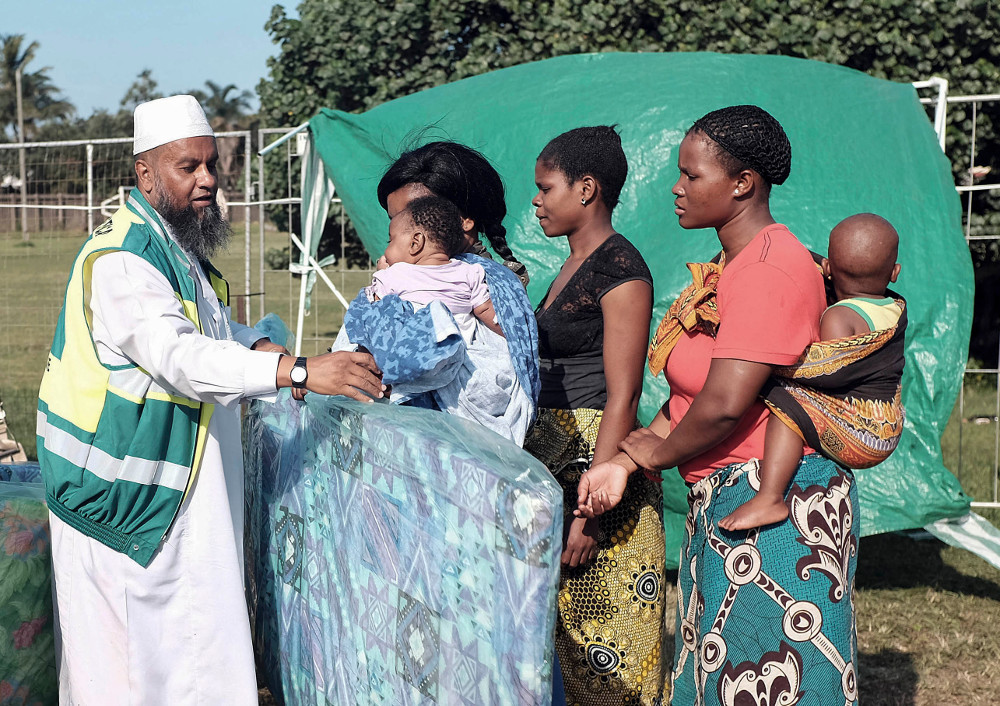
Abed Karrim of the Al-Imdaad Foundation assists at the Phoenix and Isipingo camps. (Rajesh Jantilal)
Breakfast at Phoenix is usually served at 8am sharp, but the night before some guards apparently broke into the camp’s provisions tent and stole the tea, sugar and milk. As a result, things are not running according to schedule.
But Karrim is unperturbed. When a Red Cross volunteer pops in to apologise, he simply smiles and responds: “In disaster, everything happens.”
He should know. His role as an AIF disaster response and poverty eradication practitioner has taken him as far afield as Somalia and the Democratic Republic of Congo.
When he was a teenager, he and his family were frequently rescued by army boats from 2m-deep floodwater.
“The Klip River flows behind our house in Ladysmith. My family and I were victims of eight to 10 floods in Ladysmith. I stood in lines waiting for help – like blankets and mattresses – from individuals, organisations and government.
“As a victim feeling helpless, it used to give me hope to see how everyone put their hands together to assist fellow human beings.”
It made sense then that Karrim worked actively in alleviating poverty among the disadvantaged in Ladysmith before joining the AIF seven years ago.
Still a resident of Ladysmith, he has spent the past three weeks living out of a bag at a B&B in Durban, moving between Phoenix and Isipingo Beach.
“From my experience, this disaster has been huge. It has been 22 days and people are still in the camps.
“Immigration, home affairs and the different embassies need to facilitate faster movement of the people, either back home, because many want to go home, or through reintegrating them here.
“You get this feeling that you need to thank God that you are not in this predicament.
“This morning I saw a father playing with his baby and I asked him if he was hungry. He said, ‘Not me, my baby’.
“We should try as fellow human beings to speedily be of service to victims of the camps.
“Everyone has a lifestyle – we eat at a certain time, do our daily chores at certain times. We need to try to bring that life back to them in a meaningful way so it becomes easier for them.”
Blankets help ease the pain
People from Mozambique, Zimbabwe and Malawi all gather on a piece of land the size of a football field, just 20 minutes’ drive east from the centre of Johannesburg.
Within three days, the empty field in Primrose, Germiston, has turned into a safe haven for foreigners. They are surrounded by barbed wire that also serves as a washing line.
A few provisional, shaky metal toilets have been put up on the refugee camp’s perimeter.
To walk in here is a mission. The green tents that are temporarily going to be their homes are squeezed tightly together.
Two human snakes made up of more than 600 people slowly curl towards their goal. The lines are divided: men in one and women and children in the other.
The queues are hardly moving. People have been waiting for hours — their legs tell them to sit down, but they need to stay in line.
Finally, after hours in the blazing sun, Melody Chipisa, a woman from Mozambique carrying her baby on her back, makes it to the front of the queue. She is now close to her goal.
“Where is your tag; how many people are in your family?” she is asked. She makes her way towards the minivan. It is packed with blankets from the floor to the roof. One blanket per person in a family.
“We handed out about 450 blankets today, but it’s not finished and it’s not enough for everybody, unfortunately,” says the Red Cross’s Simon Ngwenya.
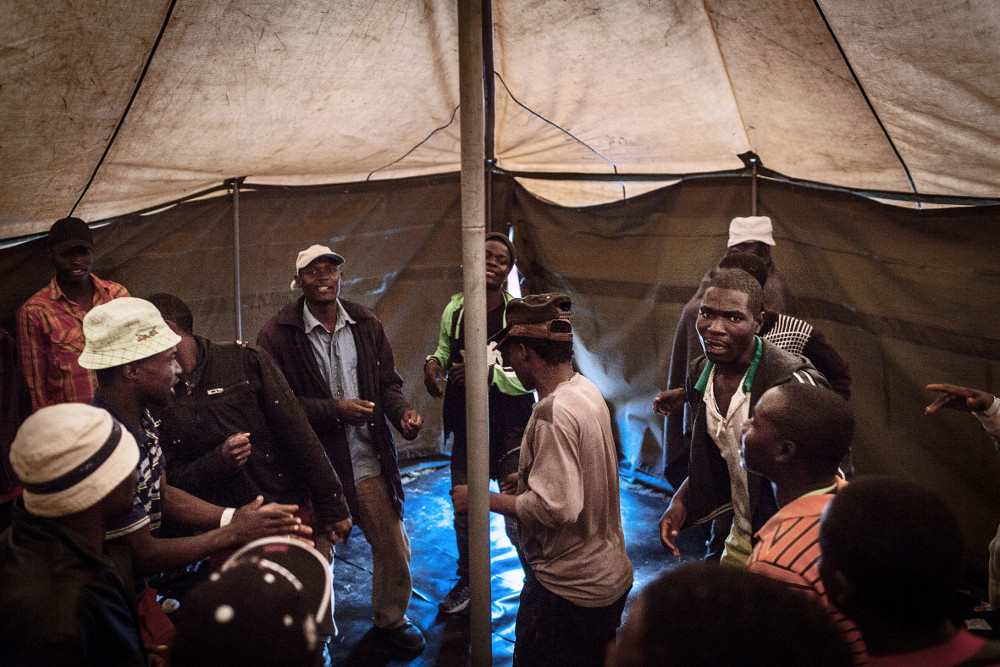
Inside one of the tents, Zimbabweans sing traditional songs and dance to keep their spirits up. (Gustav Butlex)
The blankets are the only protection the refugees will have against the coming winter.
They don’t know how many days, weeks or months the Primrose field is going to be their home.
Even though many of the displaced people have not been directly targeted by the xenophobic violence, they would rather live in the refugee camp than spend any more sleepless nights fearing the mob of raging people who hate them.
A gospel song, drums and maracas are heard around the camp. The refugees are treated to a pop-up church. Reverend Mosa Sono gets them to gather around him. Slowly he starts to preach; the Bible in his hand is thick and slightly worn out.
“In the eyes of God we are all the same. We are all equal; we all have the same rights,” he roars. The crowd simultaneously responds “Yes!” over and over again.
The children in the crowd stay close to their parents, the smallest ones carried on their mothers’ backs and the bigger ones sitting on the ground with their arms wrapped around their legs.
Some of the children have toys. A young boy is carrying a small blue car, a shining Mini Cooper. It looks brand new, as if it has never touched the dirty ground.
Another child, a girl, is hugging a big, fluffy, threadbare soft-toy tiger. It has clearly been loved and hugged tightly in the past.
Her name is Tina and she is three years old. Today she is matching her tiger with a striped shirt. It is a new garment she has just received from the church.
The camp is crowded with children, but you don’t see too many playing. Most sit quietly with their parents, just listening to their conversations. — Fredrik Lerneryd & Gustav Butlex